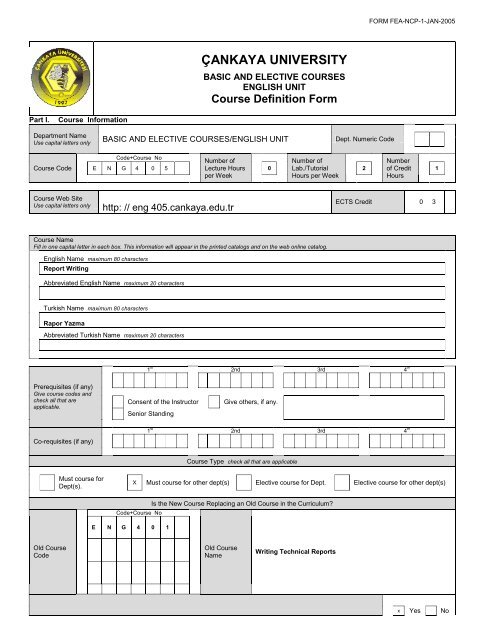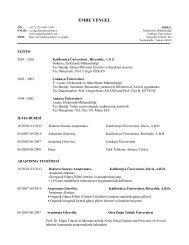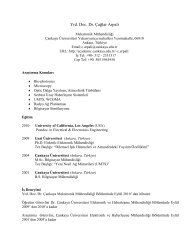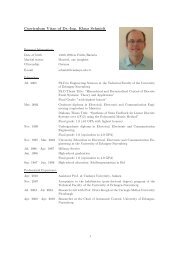New Course Proposal Form
New Course Proposal Form
New Course Proposal Form
You also want an ePaper? Increase the reach of your titles
YUMPU automatically turns print PDFs into web optimized ePapers that Google loves.
FORM FEA-NCP-1-JAN-2005<br />
ÇANKAYA UNIVERSITY<br />
BASIC AND ELECTIVE COURSES<br />
ENGLISH UNIT<br />
<strong>Course</strong> Definition <strong>Form</strong><br />
Part I.<br />
<strong>Course</strong> Information<br />
Department Name<br />
Use capital letters only<br />
BASIC AND ELECTIVE COURSES/ENGLISH UNIT Dept. Numeric Code<br />
<strong>Course</strong> Code<br />
Code+<strong>Course</strong> No<br />
Number of<br />
Number of<br />
Number<br />
E N G 4 0 5 Lecture Hours<br />
per Week<br />
0 Lab./Tutorial<br />
Hours per Week<br />
2 of Credit<br />
Hours<br />
1<br />
<strong>Course</strong> Web Site<br />
Use capital letters only<br />
http: // eng 405.cankaya.edu.tr<br />
ECTS Credit 0 3<br />
<strong>Course</strong> Name<br />
Fill in one capital letter in each box. This information will appear in the printed catalogs and on the web online catalog.<br />
English Name maximum 80 characters<br />
Report Writing<br />
Abbreviated English Name maximum 20 characters<br />
Turkish Name maximum 80 characters<br />
Rapor Yazma<br />
Abbreviated Turkish Name maximum 20 characters<br />
1 st 2nd 3rd 4 th<br />
Prerequisites (if any)<br />
Give course codes and<br />
check all that are<br />
applicable.<br />
Consent of the Instructor<br />
Senior Standing<br />
Give others, if any.<br />
Co-requisites (if any)<br />
1 st 2nd 3rd 4 th<br />
<strong>Course</strong> Type check all that are applicable<br />
Must course for<br />
Dept(s).<br />
X Must course for other dept(s) Elective course for Dept. Elective course for other dept(s)<br />
Code+<strong>Course</strong> No<br />
E N G 4 0 1<br />
Is the <strong>New</strong> <strong>Course</strong> Replacing an Old <strong>Course</strong> in the Curriculum?<br />
Old <strong>Course</strong><br />
Code<br />
Old <strong>Course</strong><br />
Name<br />
Writing Technical Reports<br />
x Yes No
FORM FEA-NCP-1-JAN-2005<br />
Most Similar<br />
<strong>Course</strong><br />
Code+<strong>Course</strong> No<br />
<strong>Course</strong> Name<br />
Frequency of Offerings<br />
Check all semesters that the course is planned to be offered.<br />
X Fall Spring Summer<br />
First Offering<br />
Academic Year<br />
20 10 / 20 11 Semester<br />
Spring X Fall<br />
Maximum Class Size Proposed 35 Student Quota for Other Departments<br />
Part II. Detailed <strong>Course</strong> Information<br />
Approximate Number of Students<br />
Expected to Take the <strong>Course</strong><br />
300<br />
Justification for the <strong>Proposal</strong><br />
Evaluation and Improvement of the Current Curriculum<br />
<strong>Course</strong> Description (English)<br />
Provide a brief overview of what is covered during the semester. This information will appear in the printed catalogs and on the web online catalog.<br />
Maximum 60 words.<br />
ENĞ 405 is a report writing course designed to help students acquire necessary skills of writing a report required for<br />
academic studies and professional purposes. In this course, students will be exposed to theoretical knowledge and<br />
process writing activities that will enable them to gather, process, and present concise and accurate data based on<br />
thorough research. The course also aims to help students to internalize and appreciate the concepts of issue, method,<br />
evidence, and conclusion as they make progress through the stages of report writing.<br />
<strong>Course</strong> Description (Turkish)<br />
Provide a brief overview of what is covered during the semester. This information will appear in the printed catalogs and on the web online catalog.<br />
Maximum 60 words.<br />
ENG 405 öğrencilerin akademik çalışmalar kapsamında ve mesleki amaçlara yönelik olarak rapor yazabilmek için gerekli<br />
olan temel becerilerin kazanmasına yardımcı olmak üzere tasarlanmış bir rapor yazma dersidir. Bu derste, yazma süreci<br />
ve teknikleriyle ilgili teorik bilgiler edinecek olan öğrenciler, kapsamlı araştırmalara dayalı kısa ve doğru veriler toplama,<br />
değerlendirme ve sunma gibi faaliyetleri içeren çeşitli yazma çalışmaları yapacaktır. Bu ders aynı zamanda öğrencilerin<br />
rapor yazma sürecinde izlenecek aşamalardan geçerken konu, yöntem, kanıt ve sonuç gibi çeşitli kavramları doğru<br />
şekilde kavramalarına yardımcı olmayı hedefler.<br />
<strong>Course</strong> Objectives<br />
Explain the aims of the course.<br />
Maximum 60 words.<br />
Upon successful completion of the course, students should be able to<br />
1. improve their academic language skills and abilities to express themselves accurately and effectively in reports.<br />
2. expand their knowledge of lexicon frequently used in academic settings.<br />
3. distinguish between a report and thesis paper.<br />
4. explain the types of reports.<br />
5. explain the features of a report.<br />
6. explain and apply the techniques to be used when writing a report.<br />
7. organize the stages of report writing process.<br />
8. apply the methods of gathering information for writing a report.<br />
9. present their report using effective presentation techniques.<br />
10. improve their research skills to avoid plagiarism.<br />
Learning Outcomes<br />
Explain the learning outcomes of the course. Maximum 10 items.<br />
Students will be able to<br />
- learn, internalize, accept and carry out the stages in a process writing approach, while writing academic and technical reports<br />
- evaluate, synthesize and use information from field-specific texts at an advanced level<br />
- listen for a specific purpose to choose relevant information and to take notes at an advanced intermediate level<br />
- initiate and maintain discussions at an advanced level and on topics about their field of study.
FORM FEA-NCP-1-JAN-2005<br />
<strong>Course</strong> Classification<br />
Give the appropriate percentages for each category.<br />
Category<br />
Percentage<br />
Mathematics & Natural Sciences 10%<br />
Engineering Sciences 10%<br />
Engineering Design & Technology 0%<br />
Architectural Theory & History 0%<br />
Architectural Design & Planning 0%<br />
Administrative Sciences 10%<br />
Humanities & Law 70%<br />
Arts 0%
FORM FEA-NCP-1-JAN-2005<br />
<strong>Course</strong> Outline<br />
List the topics covered within each week.<br />
Week<br />
Topic(s)<br />
1<br />
2<br />
4<br />
Introduction to the course and course requirements<br />
-What is a report?<br />
Types of Reports<br />
The Process of Pre-writing<br />
-Differences between a report and research paper<br />
-Distinctive features of report writing:<br />
-Objectivity<br />
-Precision<br />
-Measurability<br />
-Compliance<br />
-Liability<br />
-Technical-background reports<br />
-Instructions<br />
-Feasibility and recommendation reports<br />
-Primary research reports<br />
-Technical specifications<br />
-Report-length proposals<br />
-Business plans<br />
Choosing a topic and<br />
Making a situational analysis<br />
-Audience<br />
-Purpose<br />
-Content<br />
-Role<br />
-Constraints (Time, Budget, <strong>Form</strong>at Specifications)<br />
6<br />
General Characteristics of Reports<br />
Topic Submission<br />
Report <strong>Form</strong>at<br />
-Graphics<br />
-Factual detail<br />
-Information sources<br />
-Documentation<br />
-Realistic audience and situation<br />
-Headings and lists<br />
-Special format<br />
-Production<br />
-Length<br />
-Title<br />
-Abstract<br />
-Introduction<br />
-Methods and Experiments<br />
-Results and Discussions<br />
-Summary<br />
-References<br />
Gathering information<br />
-Appendices (optional)<br />
How can we find the information we need?<br />
How do we use books for our research?<br />
What other sources can we use for our research paper?<br />
How do we use electronic media?<br />
8 Submission of First Draft MIDTERM<br />
9<br />
Writing Reports<br />
How do we evaluate sources?<br />
How do we document our sources? Taking notes,<br />
taking direct quotations, summarizing, paraphrasing<br />
10<br />
11<br />
Post-writing:<br />
Students’ Presentations<br />
Submission of Final Draft<br />
12 Students’ Presentations<br />
-Revising<br />
-Editing<br />
-Proofreading<br />
-Review Cycle<br />
13 Students’ Presentations<br />
14 Students’ Presentations
FORM FEA-NCP-1-JAN-2005<br />
Textbook(s)<br />
List the textbook(s), if any, and other related course documents to be used as the main course material.<br />
Author(s) Title Publisher<br />
Compiled Teaching Materials and Online<br />
Sources<br />
Publication<br />
Year<br />
ISBN<br />
Reference Books<br />
List the reference books, if any, which might be recommended as supplementary material.<br />
Author(s) Title Publisher<br />
Publication<br />
Year<br />
ISBN<br />
Teaching Policy<br />
Explain how you will organize the course (lectures, laboratories, tutorials, studio work, seminars, etc.)<br />
Lecture; team/class discussions; communicative/meaningful language exercises; in- and out-of-class reading/writing tasks; library<br />
research; online research; workshops; role-plays.<br />
Laboratory/Studio Work<br />
Give the number of laboratory/studio hours required every week, if any, to do supervised laboratory/studio work, and list the names of the laboratories/studios in which<br />
these sessions will be conducted.<br />
Computer Usage<br />
Briefly describe the computer usage and the hardware/software requirements in the course.<br />
Grading Policy<br />
List the assessment tools and their percentages that may give an idea about their relative importance to the end-of-semester grade.<br />
Assessment Tool Quantity Percentage Assessment Tool Quantity Percentage<br />
Quiz(es) 1 %10 Final Exam 1 %30<br />
In –Class<br />
Performance<br />
Report Writing<br />
Process<br />
Topic,<br />
first<br />
draft<br />
%10<br />
%10<br />
Final Draft 1 %20<br />
Presentation 1 %20
FORM FEA-NCP-1-JAN-2005<br />
ECTS Workload<br />
List all the activities considered under the ECTS.<br />
Activity<br />
Quantity<br />
Duration<br />
(hours)<br />
Total Workload<br />
(hours)<br />
Attending Lectures (weekly basis) 14 2 28<br />
Attending Labs/Recitations (weekly basis) - - -<br />
Preparation beforehand and finalizing of notes (weekly basis) 14 1 14<br />
Collection and selection of relevant material (once) - - -<br />
Self study of relevant material (weekly basis) 14 1 14<br />
Homework assignments 14 1.5 21<br />
Preparation for Quizzes - - -<br />
Preparation for Midterm Exams (including the duration of the exams) 1 3 3<br />
Preparation of Term Paper/Case Study Report (including oral presentation) 1 5 5<br />
Preparation of Term Project/Field Study Report (including oral presentation) - - -<br />
Preparation for Final Exam (including the duration of the exam) 1 5 5<br />
TOTAL WORKLOAD / 30 90/30<br />
ECTS Credit 3
FORM FEA-NCP-1-JAN-2005<br />
Program Qualifications vs. <strong>Course</strong>’s Learning Outcomes<br />
Consider the below program qualifications determined in terms of learning outcomes of all the courses in the curriculum and capabilities. Look at the learning outcomes of<br />
this course given above. Relate these two using the Likert Scale by marking with X in one of the five choices at the right..<br />
Program Qualifications<br />
No<br />
(Specific to each program)<br />
MECE-<br />
01<br />
MECE-<br />
02<br />
MECE-<br />
03<br />
MECE-<br />
04<br />
MECE-<br />
05<br />
MECE-<br />
06<br />
MECE-<br />
07<br />
MECE-<br />
08<br />
Adequate knowledge in mathematics, science and engineering subjects pertaining to<br />
Mechatronics Engineering; ability to use theoretical and applied information in these areas to<br />
model and solve Mechatronics Engineering problems.<br />
Ability to identify and define complex Mechatronics Engineering problems; ability to select and<br />
apply proper analysis tools and methods and modeling techniques for formulating and solving<br />
such problems.<br />
Ability to analyze a complex system and/or a subsystem or a process and ability to design it<br />
under realistic constraints and conditions, in such a way as to meet the requirements; ability to<br />
apply modern systems design methods for this purpose.<br />
Ability to devise, select, and use modern techniques and computing tools needed for<br />
Mechatronics Engineering practice; ability to employ and make use of information technologies<br />
effectively with the knowledge of state-of-the art hardware but mostly software capabilities<br />
related to Mechatronics Engineering<br />
Ability to design and devise experimental setup, conduct experiments, gather data, analyze and<br />
interpret results for investigating engineering problems in general and for systems analysis,<br />
design, implementation and continuous improvement from Mechatronics Engineering perspective<br />
in particular.<br />
Ability to search data bases and other information sources effectively; ability to identify and<br />
extract effectively the required information and knowledge from literature and other open<br />
sources.<br />
Ability to work individually, to take independent initiatives, to create original inferences and to<br />
work in teams efficiently; ability to collaborate effectively in intra-disciplinary and multi-disciplinary<br />
teams; ability to take responsibility within teams.<br />
Ability to communicate effectively in Turkish, both orally and in writing and knowledge of a<br />
minimum of one foreign language (English in particular) at a fluency level enough to follow easily<br />
Mechatronics Engineering knowledge presented in that language and enough to communicate<br />
effectively with colleagues.<br />
Contribution<br />
0 1 2 3 4<br />
X<br />
X<br />
X<br />
X<br />
X<br />
X<br />
X<br />
X<br />
MECE-<br />
09<br />
Ability to report the findings, conclusions and interpretations related to a project, ability to write<br />
technical reports, to prepare and conduct effective presentations.<br />
X<br />
MECE-<br />
10<br />
Recognition of the need for lifelong learning; ability to access information, to follow developments<br />
in science and technology, and to keep continuous self improvement.<br />
X<br />
MECE-<br />
11<br />
Awareness of professional and ethical responsibility issues.<br />
X<br />
MECE-<br />
12<br />
MECE-<br />
13<br />
MECE-<br />
14<br />
Awareness of environmental issues, occupational safety and health, and their legal<br />
consequences.<br />
Knowledge about contemporary issues and the global and societal effects of engineering<br />
practices; awareness of the legal consequences of engineering solutions; awareness of<br />
entrepreneurship, innovation, and sustainable development.<br />
Capability to grasp business life practices such as project management, risk management,<br />
change management and strategic management.<br />
Contribution Scale to a Qualification: 0-None, 1-Little, 2-Medium, 3-Considerable, 4-Largest<br />
X<br />
X<br />
Other Relevant Information
FORM FEA-NCP-1-JAN-2005<br />
Part III. Approval Process<br />
Names of other faculty members who may be<br />
interested in teaching this course<br />
Give the Academic Title first.<br />
Faculty Member<br />
Give the Academic Title first.<br />
Signature<br />
Proposed<br />
by<br />
Date<br />
Departmental Board<br />
Meeting Date<br />
13.01.2011<br />
Meeting<br />
Number<br />
2011/01<br />
Decision<br />
Number<br />
1<br />
Department Chair<br />
Asst. Prof. Dr. Ulaş BELDEK Signature Date<br />
Faculty Academic Board<br />
Meeting Date<br />
14.01.2011<br />
Meeting<br />
Number<br />
2011/01<br />
Decision<br />
Number<br />
3<br />
Dean<br />
Prof. Dr. Levent KANDİLLER<br />
Signature<br />
Date<br />
Senate<br />
Meeting Date<br />
19.01.2011<br />
Meeting<br />
Number<br />
2011/02<br />
Decision<br />
Number<br />
3





